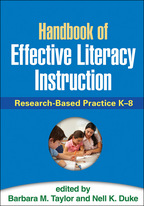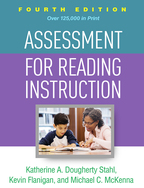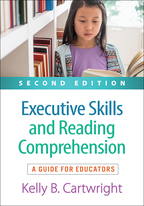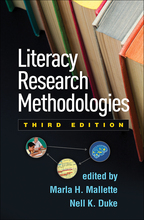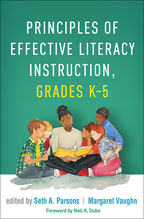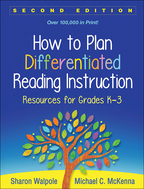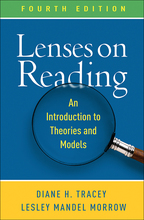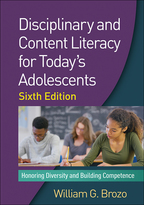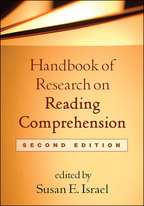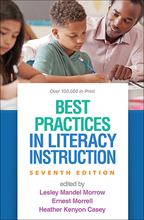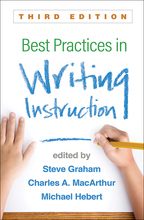Handbook of Effective Literacy Instruction
Research-Based Practice K-8
Edited by Barbara M. Taylor and Nell K. Duke
I. Fundamental Components of Effective Literacy Lessons
1. Motivating Classroom Practices to Support Effective Literacy Instruction, Alysia D. Roehrig, Elizabeth Hammond Brinkerhoff, Erik S. Rawls, and Tim Pressley
2. Literacy Tools Created and Used within Print-Rich Classroom Environments, Misty Sailors, Tracey Kumar, Shannon Blady, and Angeli Willson
3. Grouping Practices, Independent Learning Activities, and Effective Instruction, Barbara M. Taylor
4. Balanced, Differentiated Teaching: Explicit Instruction, Scaffolded Support, and Active Student Responding, Debra S. Peterson
5. Classroom Literacy Assessment: Strategies for Informing Instruction and Monitoring Student Progress, Sheila W. Valencia and Heather Hebard
6. Culturally Responsive Literacy Instruction, Ellen McIntyre and Jennifer Danridge Turner
7. Digital Literacy, Susan Watts Taffe and Laurie B. Bauer
II. Effective Teaching and Assessment to Develop Essential Literacy Abilities in Students
8. Automaticity versus Fluency: Developing Essential Literacy Abilities with Print, Susan Dougherty Johnson and Melanie R. Kuhn
9. Today's Comprehension Strategy Instruction: "Not Your Father's Oldsmobile," Katherine A. Dougherty Stahl
10. Comprehension: High-Level Talk and Writing about Texts, Keli Garas-York, Lynn E. Shanahan, and Janice F. Almasi
11. Vocabulary Instruction, Linda Kucan
12. Effective Writing Instruction in the 21st Century, Gary A. Troia
13. Reading and Writing Specific Genres, Nell K. Duke and Lynne M. Watanabe
III. Effective Integration of Literacy with Instruction in Content Areas
14. Integration of Literacy and Science, Gina Cervetti
15. Integration of Literacy and Social Studies, Anne-Lise Halvorsen, Janet Alleman, and Kristy Brugar
16. Integration of Literacy and Mathematics, Ellen Fogelberg, Patti Satz, and Carole Skalinder
17. Integration of Literacy and the Arts: Creating Classrooms That Perform, Douglas Fisher, Nan L. McDonald, and Nancy Frey
IV. Essential Collaborations for Effective Schoolwide Literacy Instruction
18. Developing and Implementing a Framework for Ongoing Schoolwide Reading Improvement, Barbara M. Taylor
19. Improving the School Literacy Program: Developing Coherence in Curriculum, Instruction, and Assessments, Catherine M. Weber
20. Improving the School Reading Program: A New Call for Collaboration, Sharon Walpole and Kristina Najera
21. Professional Learning: Professional Learning Communities, Whole-School Meetings, and Cross-School Sharing, Debra S. Peterson
22. Professional Learning with and from a Literacy Coach: A Poem in Two Voices, Misty Sailors, Katie Russell, Heather Augustine, and Kerry Alexander
23. Partnering with Parents, Kathryn Roberts

